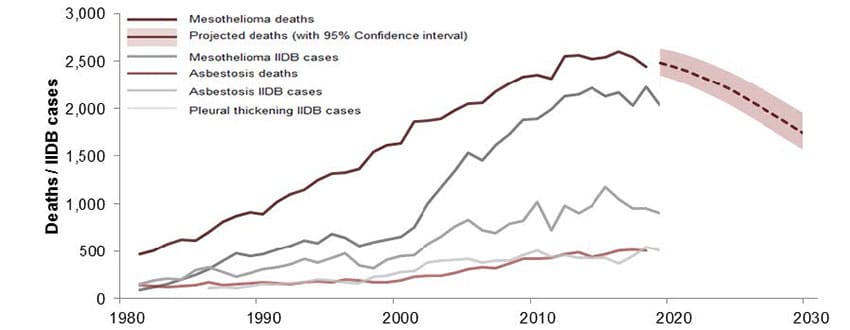Encouraging signs in HSE’s latest annual asbestos disease statistics
On 4th November, the Health and Safety Executive (HSE) released its most recent figures for asbestos-related disease and deaths in Great Britain, comprising data up to December 2019.
The statistics tell us at least one thing already widely known: the tragic consequences that asbestos-related disease continues to have for human health.
The HSE’s report shows that the country still sees more than 5,000 asbestos-related disease deaths a year, with some 2,446 mesothelioma deaths having been recorded for 2018, and a similar number of lung cancer deaths linked to past asbestos exposure. Furthermore, 503 deaths in 2018 mentioned asbestosis on the death certificate.
What the figures for recent years do indicate, however – together with projections for the decade ahead – is that asbestos-related deaths are showing signs of stabilising, and look set to drop appreciably over the 2020s.

Mesothelioma, asbestosis, and pleural thickening: time trends in annual deaths and Industrial Injuries Benefit Disablement (IIDB) cases
What explains the levelling-off of the figures?
With all asbestos-related diseases typically taking between 15 and 60 years to develop, current statistics largely reflect the legacy of past working conditions.
Asbestos-containing products were widely used prior to being fully banned in the UK construction industry in 1999. The potentially lethal material saw especially widespread use in the house-building boom after World War II, a practice that contributed to a steep rise in asbestos-related disease in the country over the last 50 years.
That increase, however, is largely attributable to asbestos exposure prior to 1980. Indeed, the newly released HSE figures indicate that deaths from asbestos-related disease largely levelled off in the 2010s, and are set to decline in the years up to 2030.
Such projections for a significant fall in asbestos-related deaths indicate that heightened asbestos awareness and training, as well as the regulations around asbestos introduced around the year 2000, are having an effect.
Britons must remain vigilant to the very real dangers of asbestos
As we continue to see all too often in the latest figures as well as in the news, asbestos-related disease has certainly not gone anyway. Moreover, it will take many years until these conditions can be truly considered a thing of the past.
With asbestos still present in buildings across the UK, the danger remains of the improper management of this extremely harmful substance bringing the risk of the inhalation of its fibres – and with it, the development of serious disease.
Among these diseases is mesothelioma, a cancer mainly affecting the external lining of the lung and the lining of the lower digestive tract. This condition is nearly always caused by asbestos exposure and is usually rapidly fatal after disease onset, which makes the annual case numbers a strong indicator of the effect of past exposures.
2,050 male mesothelioma deaths were recorded for 2018 – slightly down on recent years – and there were 396 female deaths. It is expected that annual numbers of deaths from mesothelioma will remain at about 2,500 until around 2020. However, more than half of yearly deaths now occur in those aged above 75 years, and deaths below age 70 are now falling.
Nor should the continuing risks from other asbestos-related disease be understated. Asbestos remains one of the most common causes of lung cancer, for example, after smoking. While lung cancer tends to lack specific clinical signs associated with particular causes, the overall proportion of annual deaths attributable to contact with asbestos can be estimated from epidemiological information.
Whatever the future holds, then, it is clear that we can never be complacent about our management of the risks that asbestos still poses.
Ask Oracle Solutions about our asbestos expertise
Figures like the above continue to spell out the importance of responsibly managing sites where asbestos may be present.
With the accredited services that Oracle Solutions provide to commercial clients including asbestos testing, surveys, training and removal, we are ready and waiting to discuss your concerns and give you the benefit of a fast and free asbestos quote.
